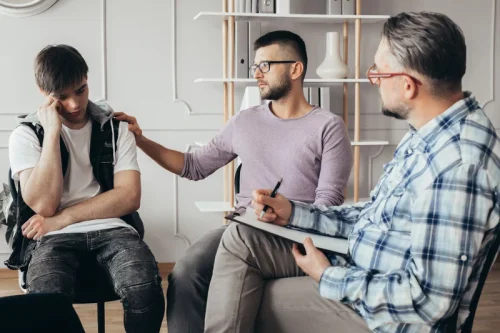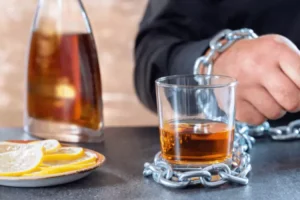
This is also very common among anxiety sufferers who either cannot afford therapy or are too embarrassed to seek it. While this may seem like it works initially, in truth, the slight assistance that alcohol provides is fleeting and it comes with great cost. https://ecosoberhouse.com/article/how-to-taper-off-alcohol/ Focusing on physical health, getting proper sleep, finding activities you enjoy, and taking regular breaks from stressors can all contribute to your improved well-being. If learning about world events causes you feelings of anxiety, turn off the screens.
Tips to change your relationship with alcohol
While small amounts of alcohol may activate GABA and cause you to relax, heavier drinking can sap GABA. In fact, drinking can change the chemistry of the brain in a way that actually makes anxiety worse. Knowing how alcohol affects anxiety may make it less tempting to have a drink to cope. Even if someone starts drinking alcohol as a way to cope with anxiety, it can quickly have the opposite effect. For one, drinking alcohol more frequently or having larger amounts can cause hangovers. These effects can make it seem like drinking alcohol is providing the person with relief from their anxiety.
Generalized Anxiety Disorder and Panic Disorder
If you have anxiety and are using alcohol to cope, it’s important that you seek support from your doctor or mental health professional. It’s never too late (or too soon) to reach out for help if you are trying to cope with a mental health condition or substance use disorder. If you are using alcohol as a self-medicating measure, you might feel it « works » to help you cope with your symptoms. While you might feel that it works in the short term, it’s more likely to cause you problems in the long run. If you have an anxiety disorder, alcohol misuse and withdrawal can make your symptoms worse. This article explores the reasons people use alcohol to cope with anxiety and the effect it may have.
The Common-Factor Model
Alcohol is a mild anesthesia and will put you in the mood for sleep — at least initially. Later in the sleep stages, alcohol disrupts REM sleep and paralytic sleep, which is when your body rejuvenates itself. Even if you’re consuming a standard amount of alcohol — a 12-ounce beer or a 5-ounce glass of wine — you’ll experience a mild detox or withdrawal. It takes your body and liver about eight hours to remove what’s essentially a poison. As this is happening, it can affect your central nervous system and cause you to feel jittery or anxious. In the United States, “moderate” typically refers to two drinks a day for adult men and one for women.
Symptoms and Types of Anxiety
- CPsychotherapies for alcohol use disorders are those with support in a majority of reviews, as identified via the systematic analysis of Miller and colleagues (2005).
- Sometimes, no matter what I do, the only thing that abates my post-drinking anxiety is waiting it out.
- In people with anxiety disorders, worry is more than just a temporary feeling and can get worse over time.1 When one is diagnosed with anxiety disorder and a substance use disorder (SUD), the two conditions can feed and worsen one another.
- We also tested the ‘direction of causation’ models with the repeated lifetime assessments of other anxiety disorders and AUD.
The major problem encountered in these studies involved the use of research methods that failed to address several important issues that might have explained the observed relationships (Allan 1995; Schuckit and Hesselbrock 1994). Specifically, some studies focused on drinking patterns rather than on alcohol dependence or described mood/anxiety symptoms rather than true psychiatric disorders. The distinction is important, because symptoms might be only temporary, whereas true psychiatric disorders are likely to require long-term and more intensive treatments, including psychotherapy and medication. Thus, few of the investigations offered assurance that an alcoholic or alcoholic’s relative actually had a long-term psychiatric syndrome rather than a temporary alcohol-induced condition. Most clinicians and researchers would agree that alcoholics experience high rates of anxiety and depressive symptoms and that these problems must be addressed early in treatment (Brady and Lydiard 1993). Increased debate, however, has focused on whether the depressive and anxiety disorders precipitated the patients’ alcoholism—in which case, longer term intensive treatments aimed at these psychiatric conditions might be required to ensure the optimum chance of recovery from alcoholism.

Generalized Anxiety Disorder
Anxiety disorder symptoms can disrupt a person’s life, making it difficult to work, participate in social events, and maintain relationships. Society would have us believe that there’s no better way to unwind after a long day than by drinking a glass of wine, cold beer, or sipping your go-to liquor. But trying to relax with a drink or two may not give you the long-term anxiety relief you want. If they continue to use alcohol to help them feel more relaxed or at ease, they might eventually feel the need to avoid any social situations where they would be unable to drink.
Wegovy linked to lower risk of alcohol use disorder in real-world study
The common-factor model of comorbid anxiety and AUDs presumes that no direct causal relationship exists between the two disorders. Instead, so-called third variables are posited to account for their joint presence. The potential relevance of such factors was demonstrated in a 21-year longitudinal study of young people (Goodwin et al. 2004), in which early presence of anxiety disorders seemed to predict the later development of alcohol dependence.
However, it is important to note that these studies typically exclude people with AUDs—a requisite standard practice to enhance the internal validity of efficacy studies. This exclusion means, however, that treatment providers must use clinical judgment when prescribing these can drinking alcohol cause panic attacks medications to comorbid patients. If you’re suffering from addiction to alcohol and anxiety, it can seem overwhelming to get help. A lot of people view alcoholism as the more immediate danger, but without treating the underlying anxiety, you’re more likely to relapse.

Alcohol and panic attacks
Other activities that are integral to participation in AA, such as sharing one’s story (i.e., public speaking), obtaining a sponsor, and becoming a sponsor (i.e., initiating social contact) also can be impaired among socially anxious alcoholics. Consistent with these hypotheses, research has shown that at least among women with social phobia, participation in AA may be less appealing and less effective than other approaches (Thevos et al. 2000; Tonigan et al. 2010). Two critical elements of CBT skills training also may be especially difficult for patients with comorbid social anxiety disorder, including drink-refusal skills and enhancing one’s social support network.

